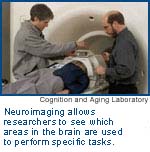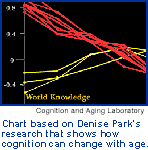The Aging Mind
From: University of Michigan | By: Denise C. Park
Marjorie is a 68-year-old civil rights lawyer who remains active and successful in her profession. Despite her high level of achievement and engagement, Marjorie finds herself having doubts about her cognitive function. She's concerned because she's noticed:
- She can't hold a 10-digit phone number in her memory long enough to dial it.
- When she dines out with friends, she used to be the first to tally up each person's tab — including tip — but now it seems she sometimes gets a wrong answer.
- When traveling alone, she's no longer willing to rent a car and drive in a big city she doesn't know.
- She's slower to answer questions, and sometimes has to ask to have information repeated.
- She finds that it is difficult to maintain her line of questioning in the courtroom if she is distracted by conversations or people coming and going.
- She recently told her husband the good news that a young lawyer in the firm was having a baby but was astonished that she couldn't remember who told her this important information.
Marjorie worries a little bit about whether these lapses are evidence of the early stages of Alzheimer's disease. She wonders whether she should take a memory course or buy memory improvement tapes. She considers, however, that she is winning more cases than ever and writes briefs and opinions with ease, often relying on younger colleagues to do the research. In meetings, her opinion about how to handle a case is given more weight than most of the others at the law firm. Younger lawyers frequently seek her out for advice on how to handle a case and sometimes even ask her advice on personal matters, particularly younger women who want to make their way to the top in the firm. Marjorie concludes that what she is experiencing is probably a part of normal aging, and feels considerable satisfaction about the many areas in her life where she is highly valued.
If the problems that Marjorie is experiencing in her everyday activities sound alarming to you,  you probably have not yet reached even middle age. These cognitive difficulties are typical of normal aging — aging that begins in the 20s and that results in regular and continuous changes decade by decade. There is nothing magical about turning 60 or 70 with respect to cognitive aging; we have strong evidence from our laboratory at the University of Michigan that changes in cognitive function are continuous and gradual.
you probably have not yet reached even middle age. These cognitive difficulties are typical of normal aging — aging that begins in the 20s and that results in regular and continuous changes decade by decade. There is nothing magical about turning 60 or 70 with respect to cognitive aging; we have strong evidence from our laboratory at the University of Michigan that changes in cognitive function are continuous and gradual.
Cognitive aging is a slippery slope rather than a cliff. Individuals' performance slowly changes, beginning in one's 20s, and, over time, individuals start to notice that they are not as "mentally sharp" as they used to be in some domains. However, this decline in raw processing power is offset by experience. As we age, we continue to learn, and particularly for areas in which we are expert, little change and even some improvement occurs, as evidenced by the continued success Marjorie has in her work and the fact that she is viewed as a source of knowledge and wisdom by younger coworkers.
What are some specific changes that occur in the mind as we age?
As we age, we need more time to respond to cognitive tasks. When there is a lot of information to remember or there is a hard task to perform, the slowing of cognitive processes will interfere with performance, such as when an older driver approaches a complex and unfamiliar intersection with many signs and has to make a quick decision. Over time, people make small accommodations in their lives, even if they are not sure to what cognitive changes they are responding. Marjorie's reluctance to drive a rental car on busy highways in unfamiliar cities, where rapid responding to unfamiliar information is required, is a good example of an accommodation.
We also have less capacity to process information as we get older. Our working memory or "mental desktop" cannot hold as many items as it used to, and our ability to manipulate information on this mental desktop decreases. This decline in working memory function explains why Marjorie may not be quite as efficient at mentally adding a tip to a bill and dividing the total in her head when she's dining out with friends.
We have also found that, with age, there is more susceptibility to disruption from interfering information. Older adults have more difficulty ignoring irrelevant information and resuming tasks where they left off if they are interrupted, as Marjorie noticed both in conversations and in the courtroom. Cognitive aging psychologists describe this as a difficulty in effectively inhibiting irrelevant material so that one can focus on relevant information. Decreased inhibitory function contributes to some difficulties in remembering.
What happens to memory function as we age?
Speed of processing, working memory and inhibitory function are the building blocks of higher order processes like memory. As these processes become less efficient, so does memory. As Marjorie noted in the computer class, she was a little slower to pick up new information on a relatively unfamiliar topic than her younger colleagues. Thus, learning of new information readily occurs, but not as easily as when an adult was younger. Another change is that older adults can frequently remember facts that they have heard, but not the source from which they heard it, as exemplified by Marjorie's inability to remember from whom she learned that her colleague was having a baby.
Long-term memory, or memory for past information, declines decade by decade at the same rate as  speed of processing and working memory in normal, healthy older adults. Although memory for events and specific information is age-sensitive, the news is not all bad. The graph (right) shows that there are declines in different types of speed, working memory and long-term memory, but knowledge about the world (as measured by vocabulary) is quite resistant to the effects of aging, and in fact, in some domains, older adults likely know more than younger adults. The resistance of knowledge to the effects of age is very good news for older workers and their employers, and explains the respect and success that Marjorie experiences in her law firm, despite the declines that occurred with age.
speed of processing and working memory in normal, healthy older adults. Although memory for events and specific information is age-sensitive, the news is not all bad. The graph (right) shows that there are declines in different types of speed, working memory and long-term memory, but knowledge about the world (as measured by vocabulary) is quite resistant to the effects of aging, and in fact, in some domains, older adults likely know more than younger adults. The resistance of knowledge to the effects of age is very good news for older workers and their employers, and explains the respect and success that Marjorie experiences in her law firm, despite the declines that occurred with age.
Do I have Alzheimer's disease?
It is hard not to wonder about this every time one has a memory lapse, given the focus on Alzheimer's disease in the popular press. None of the cognitive problems that I have described in this article are predictive of Alzheimer's disease. If you find yourself or a loved one getting lost in familiar places, not being sure how to manage finances, or showing some evidence that everyday tasks that were easily performed are now challenging, then it is time to see your physician for a referral to a neurologist or psychiatrist who specializes in memory dysfunction. Even these problems are sometimes symptoms of other reversible conditions.
How can I keep my mind healthy as I age?
Cognitive performance is a direct result of brain activity and brain structure, much like cardiovascular fitness relates to our ability to exercise and perform physical tasks. The study of cognitive aging is probably where the study of heart disease was 30 or 40 years ago. When I was a child, scientists could describe the various diseases of the heart but there was little understanding that diet, smoking and exercise all played important roles in having a healthy heart. Right now, we have an excellent understanding of the kinds of cognitive problems that occur as people age, but less knowledge about what to do to keep the mind healthy. I am hopeful that we are entering an era where we will soon know what one should do to maximize cognitive fitness.
At this point, I would not advise people to take arduous memory courses that train them to use effective but difficult techniques to remember things. I once published a paper showing that memory scientists themselves rarely use the special techniques touted in memory training classes.
I do recommend that individuals stay cognitively engaged. I believe that having a rich intellectual life — which includes activities like being a member of a book-reading group; seeing and discussing plays and concerts; playing chess or cards or doing crossword puzzles; or taking courses of any sort that interest you — all are as effective as direct cognitive training. There is some evidence, as well, that active fitness programs maintain cognitive vitality. Stay happy; stay fit and healthy; and maintain both intellectual and social interests.